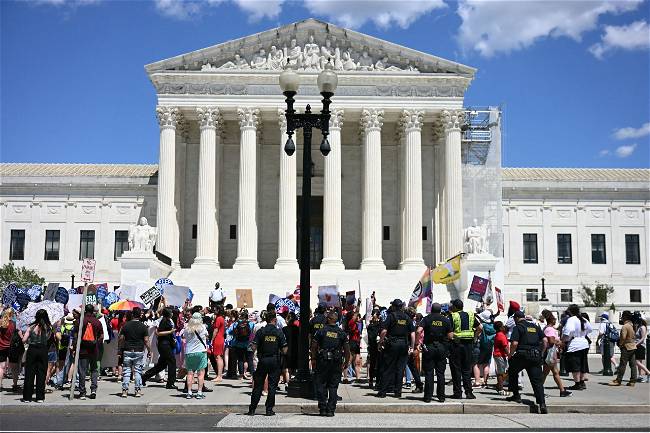The United States Supreme Court ruled on Thursday to permit – for now – abortions to be performed in Idaho when pregnant women are facing medical emergencies.
It is the first time the nation’s highest court has ruled on the scope of a state’s abortion ban after overturning Roe v. Wade in 2022.
According to Mail Online, Justices were asked to weigh whether the state violated federal law mandating emergency care for any patient, such as providing abortions for pregnant women in life-or-death situations.
The state of Idaho argued that the law cannot supersede its abortion ban, which has an exception for the life – but not the health of the mother.
The Biden administration disagreed and sued. The case then returned to a lower court.
In a 6-3 vote, three conservative justices sided with all three liberal justices to dismiss the case, writing it had been “improvidently granted”.
The decision will for now offer protection from prosecution for doctors who determine an abortion is the best treatment for a patient in jeopardy in states.
But the court’s side-step from the case’s substance means the door remains open to further challenges to Emtala.
In a part assent, part dissent, the court’s newest member, liberal Justice Ketanji Brown Jackson criticised the court for the dismissal, saying it had “shirked its duty to resolve a pressing legal issue”.
“The conflict between state and federal law still exists – in real life”, she said, referring to Idaho’s near-total abortion ban. “There is simply no good reason not to resolve this conflict now.”
Justice Jackson’s rebuttal was echoed by some leading abortion rights activists, who said the court had left women vulnerable.
“We are relieved for the moment, but hardly celebrating. The Court kicked the can down the road,” said Nancy Northup, president of the pro-choice advocacy group the Center for Reproductive Rights. “Women with dire pregnancy complications and the hospital staff who care for them need clarity right now.”
In Idaho, abortion is outlawed throughout pregnancy except in cases of rape, incest, some cases of nonviable pregnancies and when “it is necessary to prevent the death of the pregnant woman”.
Doctors who violate the law risk prison time, steep fines and the loss of their medical license.
In court documents, a group of 678 Idaho doctors said the ban already has harmed women denied care while suffering from serious pregnancy complications.
But anti-abortion activists have countered that doctors have wilfully misinterpreted the law, which allows for life-threatening cases.
The Idaho Hospital Association said it applauded the decision as a “significant step toward ensuring that hospitals and physicians can offer critical care without government interference”.
It added, however, that the abortion law “still needs added clarity to protect the health and well-being of Idaho women”.




































